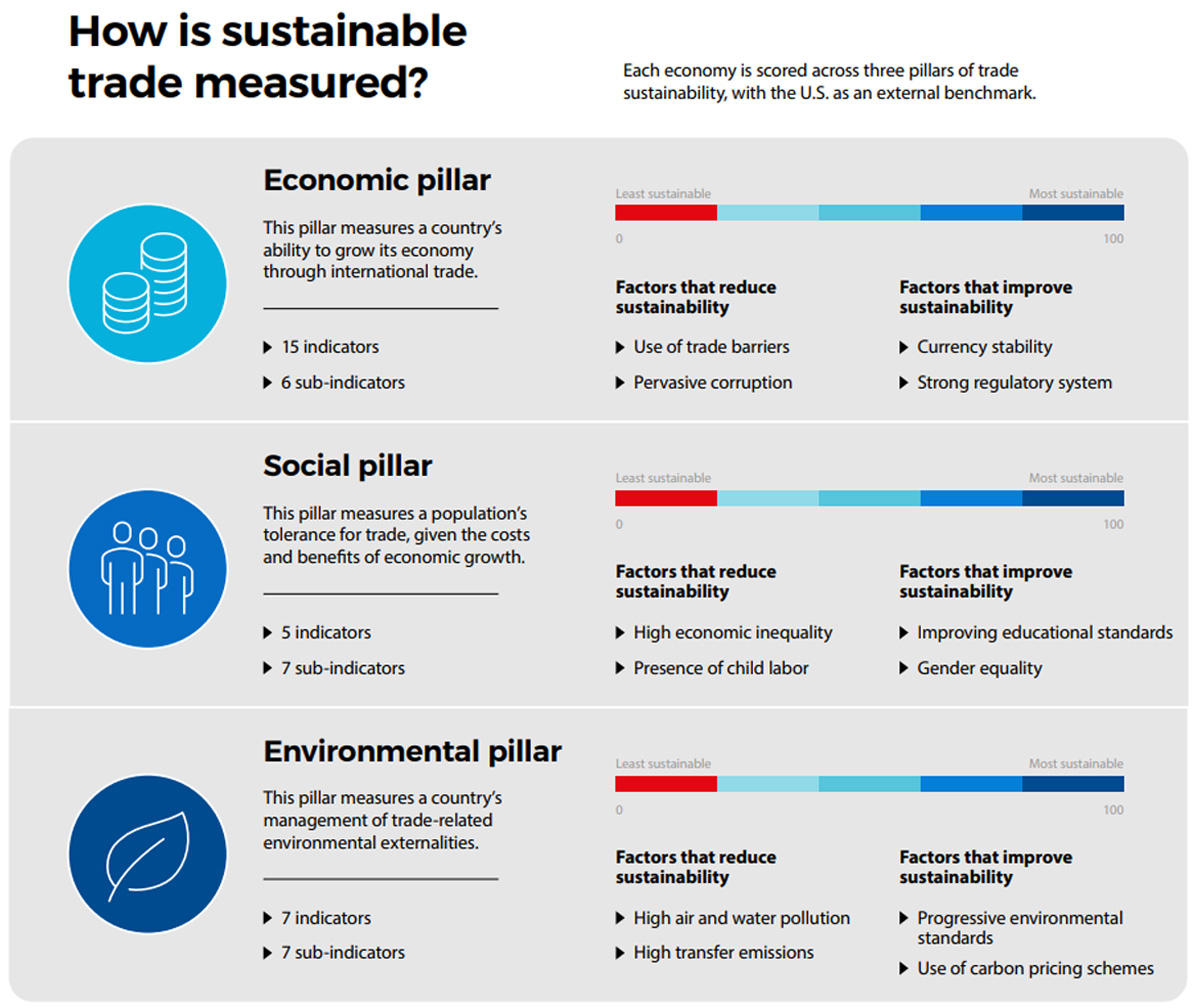The Sustainable Trade Index measures the capacity of 20 economies – including 19 in Asia, and the United States – to participate in international trade in a manner that supports the long-term domestic and global goals of economic growth, environmental protection, and better social equity.
The Covid-19 pandemic has provided a stark and painful reminder of why the concept of sustainable trade is so critical. The Hinrich Foundation Sustainable Trade Index 2020, commissioned to the Economist Intelligence Unit (EIU), examines the role of sustainable trade for building back better in a post-pandemic world. It identifies four areas policymakers, business leaders and NGOs should address for more sustainable growth.
Resources available for download:
- Sustainable Trade Index 2020 report
- Infographics
- Data workbooks
- Economy-specific reports
- Press releases
Overview of the STI 2020 findings
- Japan and South Korea are joined once again in the group of the other mainstays atop the index: Singapore, Hong Kong, Taiwan and the US.
Japan and South Korea share many similarities, including low growth rates, difficulty in attracting in FDI and volatile trade-weighted exchanged rates. But both benefited from indicators new to the 2020 STI, namely the existence of carbon pricing schemes and efforts to combat human trafficking.
Elsewhere, the most notable move in the index was in Vietnam. After making progress in previous editions of STI, there was backsliding relative to other countries in the index in the social and environmental pillars. That dragged its rank to 16th overall, just behind in India and just ahead of Indonesia. For a country that is becoming the next hub of supply chains in the Asian region, that is not an encouraging development.
Access the Hinrich Foundation Sustainable Trade Index 2020 resources:
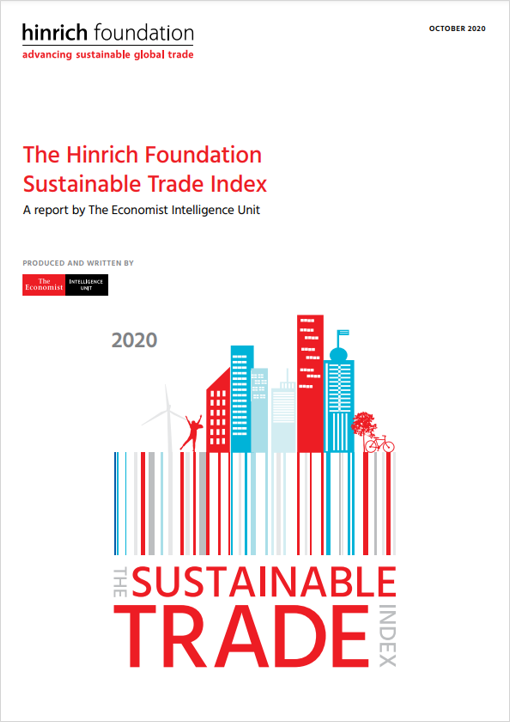
Four policy priorities to build back better after the pandemic
If the covid-19 pandemic and resulting economic crisis around the world teaches us anything it is that preparedness matters. The original intention behind the STI was not necessarily to serve as a tool for crisis prevention, but it has taken on that dimension. To that end, we identify four areas policymakers, business leaders and NGOs should address if and when the next crisis comes:
1) Reducing inequality
Unless significant steps are taken now, the gap between the rich and the poor will only widen further when the next crisis comes, making sustainable trade all the more difficult.
2) Improving education
Without progress in education, many countries in the STI may find themselves left behind.
3) (Re)lowering barriers to trade and investment
None of the developing countries (in the STI) have the internal demand or the capital base to grow, let alone grow in a manner that will alleviate poverty and create a middle class. Trading, and trading sustainably, are really their only paths. That means keeping their economies open and welcoming the kind of foreign investment that supports those goals.
4) Building on the environmental benefits of the pandemic
Governments have an opportunity to apply the environmental lessons learned from the crisis to their policy decisions and ask themselves questions about how to retain the gains already made.
Watch a recording of our launch event titled "Building back better with sustainable trade", featuring seven prominent experts.
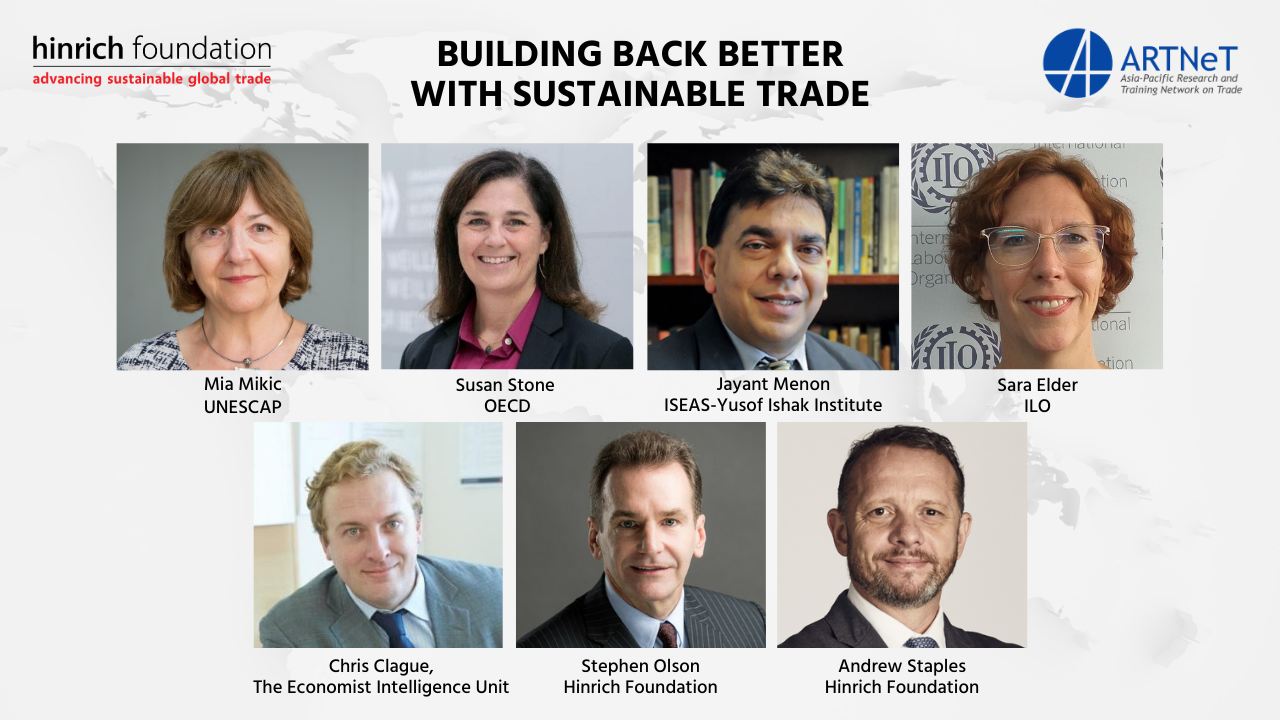
The Sustainable Trade Index dataset and economy-specific reports
The detailed results for the 20 economies reviewed in the STI are presented in an excel format. Results can be compared across economies, indicators and years.
Individual reports with focused highlights for the following economies are also available in our download pack: Brunei, Cambodia, China, Hong Kong, India, Indonesia, Japan, Laos, Malaysia, Myanmar, Pakistan, Philippines, Singapore, South Korea, Sri Lanka, Taiwan, Thailand, United States, Vietnam.
Here are samples of the resources:
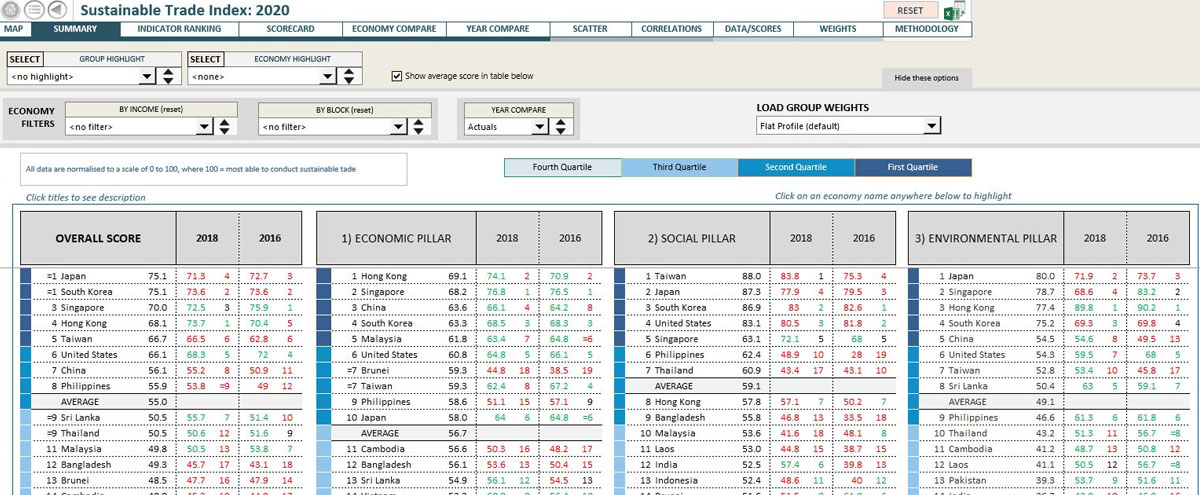
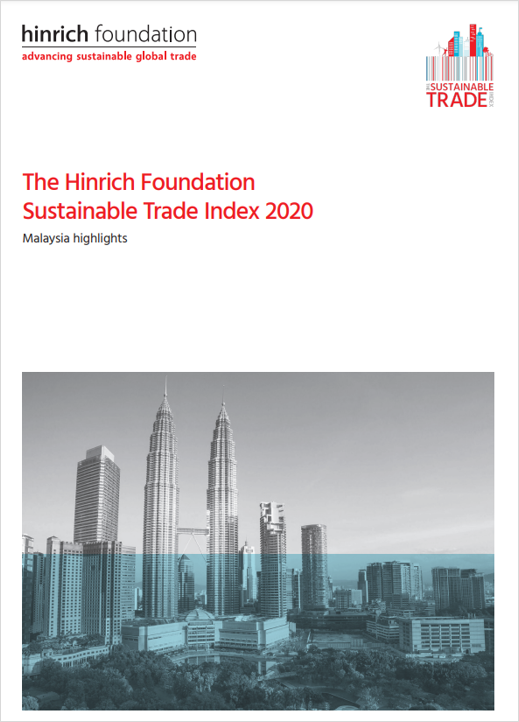 |
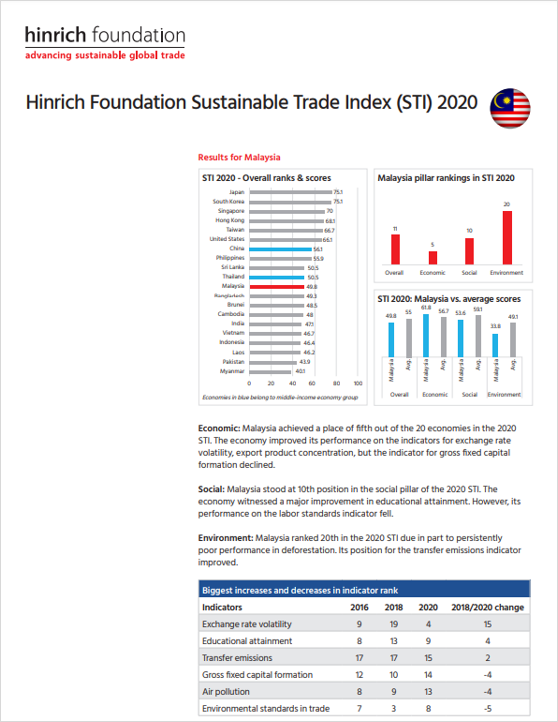 |
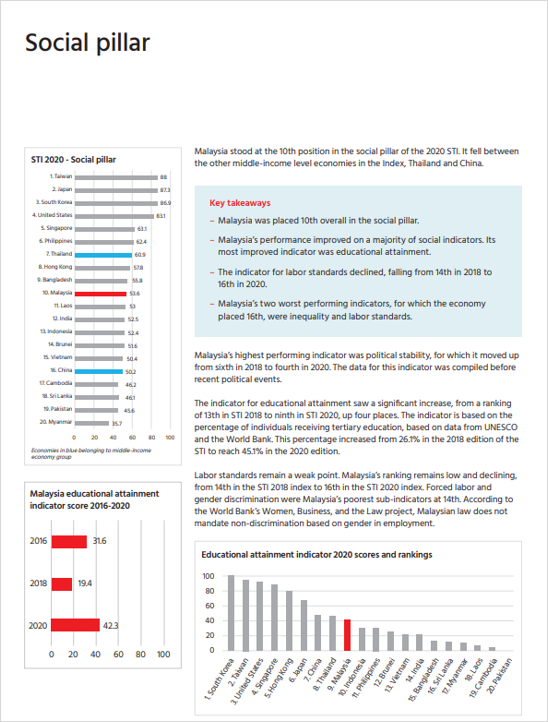 |
© The Hinrich Foundation. See our website Terms and conditions for our copyright and reprint policy. All statements of fact and the views, conclusions and recommendations expressed in this publication are the sole responsibility of the author(s).
Related news

Philippines moves up in sustainable trade index

28 October 2020
The Philippines outranked other emerging markets in Asia as it moved up one spot to 8th place in the Sustainable Trade Index 2020, according to the Economist Intelligence Unit bi-annual report commissioned by Hinrich Foundation.

Japan, S Korea share sustainable trade crown

28 October 2020
Japan and South Korea are tied for the top spot in the Sustainable Trade Index 2020, while Hong Kong ranked first in the economic pillar, a survey by the Hinrich Foundation showed. The report pointed out that Hong Kong's presence atop the STI and many other indexes has come into jeopardy, especially over the past six months.

PHL jumps 2 rungs in Asia Pacific economies’ trade poll

27 October 2020
The Philippines scored 55.9, from 53.8 in 2018, out of 100 in the Hinrich Foundation’s Sustainable Trade Index 2020. As such, it improved to eighth to land behind Japan, South Korea, Singapore, Hong Kong, Taiwan, the United States and China.

The Hinrich Foundation Sustainable Trade Index 2020

02 November 2020
Firms stepped up commitments to corporate social responsibility initiatives. Investors started incorporating environmental, social and governance (ESG) issues into their asset allocation decisions. And consumers voted with their wallets to support sustainable production. The question now is whether the pandemic puts that progress in jeopardy.

Bangladesh outdoes India, Pakistan in sustainable trade

29 October 2020
Bangladesh has surpassed India and Pakistan in terms of sustainable trade on the back of better performance in economic and social areas. However, the ranking in the environmental aspect is poor for Bangladesh due to worsening deforestation and air and water pollution, according to the latest Sustainable Trade Index 2020.

Philippines climbs two notches in Sustainable Trade Index

28 October 2020
The Philippines moved up two places to rank eighth out of 20 economies in this year’s Hinrich Foundation Sustainable Trade Index, which looks at a country’s capacity to participate in international trade while promoting economic growth, environmental protection and social benefits.

Philippines moves up in sustainable trade index

28 October 2020
The Philippines outranked other emerging markets in Asia as it moved up one spot to 8th place in the Sustainable Trade Index 2020, according to the Economist Intelligence Unit bi-annual report commissioned by Hinrich Foundation.

Japan, S Korea share sustainable trade crown

28 October 2020
Japan and South Korea are tied for the top spot in the Sustainable Trade Index 2020, while Hong Kong ranked first in the economic pillar, a survey by the Hinrich Foundation showed. The report pointed out that Hong Kong's presence atop the STI and many other indexes has come into jeopardy, especially over the past six months.

PHL jumps 2 rungs in Asia Pacific economies’ trade poll

27 October 2020
The Philippines scored 55.9, from 53.8 in 2018, out of 100 in the Hinrich Foundation’s Sustainable Trade Index 2020. As such, it improved to eighth to land behind Japan, South Korea, Singapore, Hong Kong, Taiwan, the United States and China.

The Hinrich Foundation Sustainable Trade Index 2020

02 November 2020
Firms stepped up commitments to corporate social responsibility initiatives. Investors started incorporating environmental, social and governance (ESG) issues into their asset allocation decisions. And consumers voted with their wallets to support sustainable production. The question now is whether the pandemic puts that progress in jeopardy.

Bangladesh outdoes India, Pakistan in sustainable trade

29 October 2020
Bangladesh has surpassed India and Pakistan in terms of sustainable trade on the back of better performance in economic and social areas. However, the ranking in the environmental aspect is poor for Bangladesh due to worsening deforestation and air and water pollution, according to the latest Sustainable Trade Index 2020.

Philippines climbs two notches in Sustainable Trade Index

28 October 2020
The Philippines moved up two places to rank eighth out of 20 economies in this year’s Hinrich Foundation Sustainable Trade Index, which looks at a country’s capacity to participate in international trade while promoting economic growth, environmental protection and social benefits.
Related events

Building back better with sustainable trade
27 October 2020
On 27 October 2020 the Hinrich Foundation and Economist Intelligence Unit jointly launched the Sustainable Trade Index 2020, at an event co-organized with the UNESCAP-ARTNeT.

The race for a new, greener globalization
19 November 2020
The Hinrich Foundation and the Lee Kuan Yew School of Public Policy invited six experts for this timely event on identifying policy priorities for building back better in the post-pandemic world with sustainable trade.
Related research

Indonesia's "Omnibus Bill" weakens labor and environmental standards
13 October 2020

China's "dual circulation" will bring more sustainable trade
14 September 2020

Indonesia's "Omnibus Bill" weakens labor and environmental standards
13 October 2020

China's "dual circulation" will bring more sustainable trade
14 September 2020
